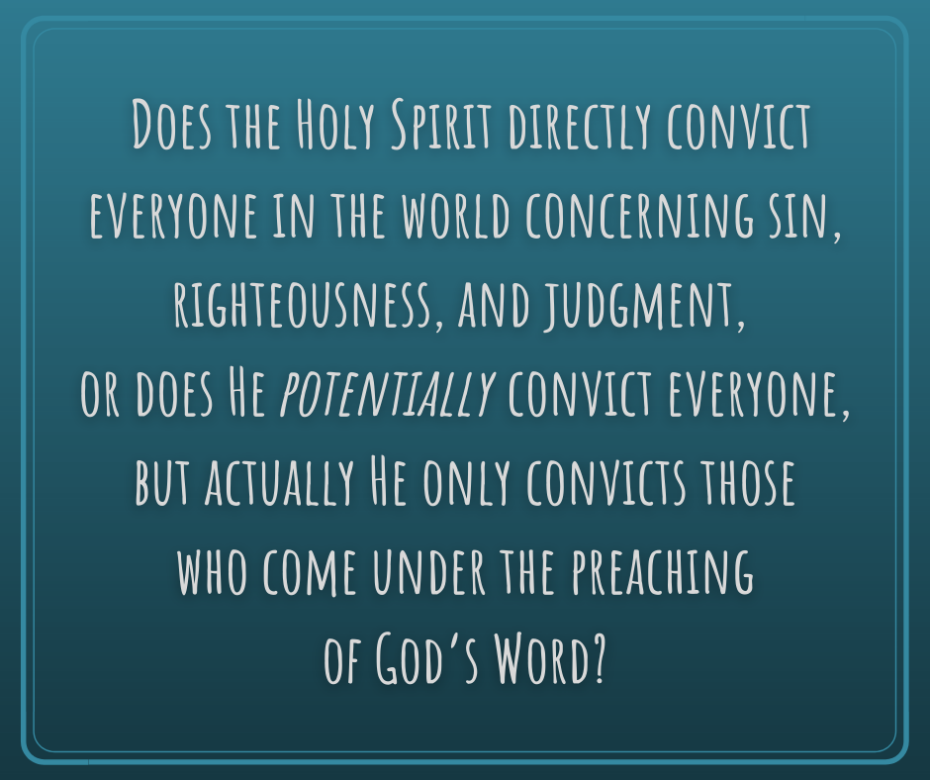Recently I wrote a blog in which I discussed John 16:7-11 and the fact that the Holy Spirit convicts the world of sin, righteousness, and judgment. In the blog, which you can see here, I suggested that the Holy Spirit does the convicting work directly. That is, I suggested that every human being knows that he is a sinner, that God is righteous, and that there is a coming day of judgment. While a person might later reject the truth and become hardened, there is no such thing as a person who never was directly convicted by the Holy Spirit on these three issues.
I received a response to that blog, suggesting that the convicting ministry of the Holy Spirit is not direct, but indirect:
I believe that the Holy Spirit will convict the world through us if we faithfully and accurately proclaim the gospel. We are a part of His convicting ministry. But I do not feel that the Holy Spirit blanketly convicts everyone in the world of sin, righteousness, and judgment.
Dr. Earl Radmacher takes exactly the same point of view that I do:
Though John 16:8 does not say that the Holy Spirit convicts unbelievers directly, it does say He convicts “the world.” However, He uses believers as His “agents” of conviction…what the apostles began as “agents” of the Holy Spirit’s convicting work, we are to continue. (Salvation, p. 93).
That is a great point to consider. I should have discussed this question in my earlier blog.
First, I agree that the Holy Spirit uses us to help convict people.
Second, I do not believe that is what John 16:7-11 is talking about. I think it is speaking of a direct ministry to everyone.
Third, here are several reasons why I am convinced that the Holy Spirit directly convicts everyone of sin, righteousness, and judgment:
- If only those who hear the preaching of God’s Word receive this convicting ministry, then the Holy Spirit does not convict the world. In that case He would potentially convict the world. But in actuality, there would be billions of people who go to the grave never having been convicted of their own sin, of God’s righteousness, or of coming judgment.
- The Scriptures are clear that the creation is a witness to everyone. Psalm 19:1 says that “the heavens declare the glory of God; and the firmament shows His handiwork.” In Rom 1:19-22, Paul says that “what may be known of God is manifest in them, for God has shown it to them…His invisible attributes are clearly seen, being understood by the things that are made, even His eternal power and Godhead, so that they are without excuse, because, although they knew God, they did not glorify Him as God, nor were they thankful, but became futile in their thoughts, and their foolish hearts were darkened.”
- Jesus said, “And I, if I am lifted up from the earth [= the cross, resurrection, and ascension], will draw all peoples [lit. all] to Myself” (John 12:32).
- The Apostle John wrote, “That was the true Light which gives light to every man coming into the world” (John 1:9).
- In John’s Gospel, we find many examples in which Jesus never mentioned sin, righteousness, or judgment when He evangelized. If those are things which the Holy Spirit uses in us to proclaim every time we evangelize, then surely the Lord Jesus would have proclaimed all three of those points each and every time He evangelized.
- In Acts, we find many examples in which the Apostles or Philip the evangelist failed to mention all three of these elements. Luke tells us that Philip “preached Christ to [the Samaritans]” and that “he preached the things concerning the kingdom of God and the name of Jesus Christ” (Acts 8:5, 12). While Philip might have mentioned sin, righteousness, and judgment, Luke fails to mention that. When Philip then evangelizes the Ethiopian eunuch, he explains the cross via Isa 53:7-8 and then he “preached Jesus to him” (Acts 8:30-35). Again, no mention is made of sin, righteousness, and judgment. Compare also Acts 10:34-43; 13:16-41; 15:7-11; 16:30-32. In fact, I am unaware of a place in the NT where those three elements are all mentioned in either an evangelistic text or a passage in which the author is reminding believers about the saving message.
- The Bible tells us that everyone has a conscience (Rom 2:15; 1 Tim 4:2; Titus 1:15). Our conscience is a God-given testimony to the fact that we are sinners and God is righteousness.
I agree that the Holy Spirit uses believers to reach unbelievers. However, I do not believe that our witness is by itself. In the OT, matters are confirmed by at least two or three witnesses. If the only witness to the world was the preaching of believers, there would only be one witness. But there is also the witness of creation. While the witness of creation could be part of the Holy Spirit’s convicting ministry, I suspect that He convicts unbelievers in their consciences directly, even apart from creation or the preaching of the Word. So the person who never even hears a word from the Bible is being drawn to God via creation and the convicting ministry of the Holy Spirit. If he responds to that drawing by seeking God (Acts 17:11, 27; Heb 11:6), then the Holy Spirit will send them someone to tell them about Jesus (Acts 16:9).


